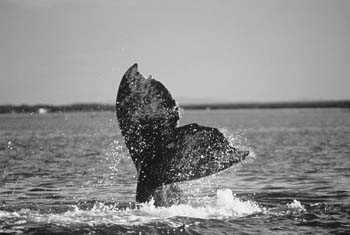Boycotts and Banking
The gray whale's last wild refuge is threatened by Mitsubishi/Mexicomine
By Eric Johnson
THE SAN IGNACIO LAGOON, which could soon be home to the world's biggest salt mine, supports a small, healthy fishing industry that provides its people with a subsistence living. The prospect of hundreds of new jobs that the salt mine would provide is attractive to some locals. Others fear that the mine would hurt the area's budding eco-tourist industry, which depends on the ecological health of the West Coast's last wild gray whales' breeding area.
Because the Mexican Department of Commerce is headed by the same man who runs ESSA, environmentalists have little hope that local politics will provide a way to stop the mine. In an effort to preserve the gray whale nursery, the Earth Island Institute is attempting to focus international public attention on the Mitsubishi Corp. and its 158 sister companies, says organizer Nathan LaBudde. The group is being joined in this effort by the Natural Resources Defense Council, which is run by Robert Kennedy Jr., who has brought some star power to the fight
Mitsubishi, the largest industrial conglomerate in the world, operates under Japanese law as a keiretsu--a word which has no English translation and a structure that has no equivalent in American business. Mitsubishi Corporation, the branch of the keiretsu which is backing the ESSA mine, is a trading house that buys and sells companies for the corporate family. The Mitsubishi Bank, which is the world's largest bank, provides the cash for the whole group. The popular brand names in the U.S.--Mitsubishi Motors and Mitsubishi Electric--are technically separate from each other and also from the bank, the corporation and all of their cousins.
Steve Weschelblatt, a spokesperson for Mitsubishi International Corporation (a subsidiary of the Mitsubishi Corporation) says the "family" metaphor works best. "You shouldn't call it a conglomerate, because that indicates a relationship of ownership," Weschelblatt says. "Once upon a time, the companies were all connected, but they were broken up after World War II. Now it's like a family, with shared traditions and common ancestors."
All of the branches of the keiretsu do own shares in the others, however. They provide each other with materials and services in a "vertically integrated" setup that in America was once known as a monopoly. In addition to the firms that bear the company name, Mitsubishi also owns Nikon Camera, the Union Bank of California and scores of other familiar brands.
J.C. Callender of the Rainforest Action Network has studied Mitsubishi closely over the past 12 months. During that time, he ran the last leg of a 10-year boycott against the entire conglomerate. Although he is highly critical of the companies' environmental policies, Callender seems to have a grudging respect for the way the operation functions.
"They are simply the world's industrial leader," Callender says. "Because they are so diversified and so structurally oriented, they have the power to change the way business is done worldwide. If Mitsubishi can be encouraged, persuaded or forced to pursue more environmentally responsible ways of doing business, they would pursue them with an aggressiveness that would put pressure on every other company in the world."
While Callender and his organization support the campaign being waged by Earth Island and NRDC, he is in a squirrelly position. Just last month, Rainforest Action Network penned an agreement with the heads of Mitsubishi Motors and Electric that ended its boycott of those branches. But just as he seems to genuinely believe that RAN's historically adversarial relationship with the two U.S.-based companies has changed, he remains skeptical about the Mitsubishi family's overall commitment to the environment. "Mitsubishi has a long track record of destructive projects from Malaysia to Canada to Brazil," Callender says. "On every continent, they've participated in projects that are shameful."
Weschelblatt insists that the family is no worse than any other. "The company is doing the best it can to only do things in the most environmentally responsible manner," he says.
"They've learned to talk a good game," Callender concedes. "We've talked to the local representatives of Motors and Electric to try to get them to put pressure up the chain of the keiretsu, but we haven't really seen any substantial action yet."
Copyright © Metro Publishing Inc. Maintained by Boulevards New Media.
![]()

Richard Sobol--IFAW
From the March 19-25, 1998 issue of Metro Santa Cruz.
![[MetroActive Features]](/features/gifs/feat468.gif)